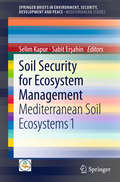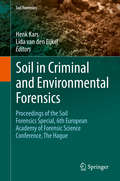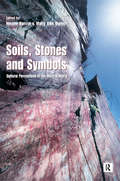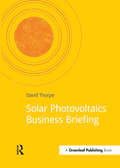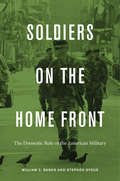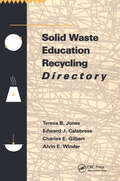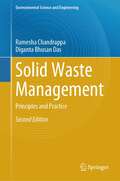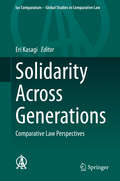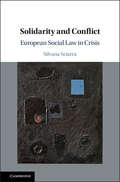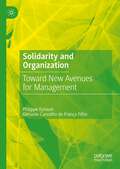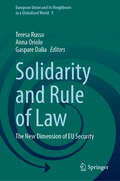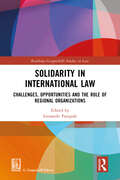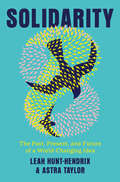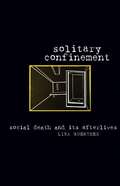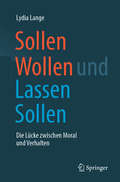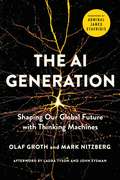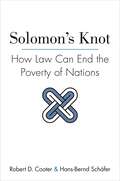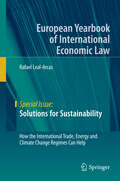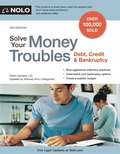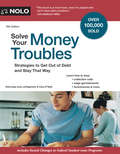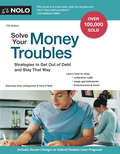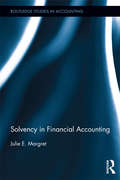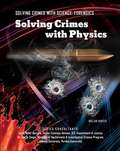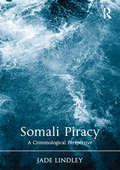- Table View
- List View
Soil Security for Ecosystem Management: Mediterranean Soil Ecosystems 1
by Sabit Erşahin Selim KapurThe term "Soil Security" is used in the context of maintaining the quality and quantity of soil needed in order to ensure continuous supplies of food and fresh water for our society. Topics in this unique book on the management of soil sustainability in the Mediterranean region include: soil information, land degradation, land desertification, pedoenvironments, and the carbon cycle and sequestration. One main focus of the book is the description of new approaches that have been adapted with regards to interdisciplinary soil ecosystem management to combat and mitigate desertification. The contributing authors are renowned experts in their fields which cover the subjects on traditional as well as innovative land use and management.
Soil in Criminal and Environmental Forensics
by Henk Kars Lida EijkelThis introductory volume to a new series on Soil Forensics gives a kaleidoscopic view of a developing forensic expertise. Forensic practitioners and academic researchers demonstrate, by their joint contributions, the extent and complexity of soil forensics. their reports exemplify the broad range of sciences and techniques applied in all stages of forensic soil examinations, from investigations at crime scenes to providing evidence that can be used in court proceedings. Moreover the necessity is depicted of co-operation as a condition for any work in soil forensics between scientists of different disciplines, but no less between scientists and law enforcers. Soils play a role in environmental crimes and liability, as trace evidence in criminal investigations and, when searching for and evaluating, buried human remains. This book shows soil forensics as practiced in this legal context, emerging and solidifying in many countries all over the world, differing in some respects because of differences in legal systems but ultimately sharing common grounds.
Soils Stones and Symbols Cultural Perceptions of the Mineral World: Archaeological And Anthropological Perspectives On The Mineral World
by Nicole Boivin & Mary Ann OwocEthnographic and archaeological records feature a rich body of data suggesting that understandings of the mineral world are in fact both culturally variable and highly diverse. Soils, Stones and Symbols highlights studies from the fields of anthropology, archaeology and philosophy that demonstrate that not all individuals and societies view minerals as commodities to be exploited for economic gain, or as passive objects of disembodied scientific enquiry. In visiting such diverse contexts as contemporary India, colonial-period Australia and prehistoric Europe and the Americas, the papers in this volume demonstrate that in pre-industrial societies, minerals are often symbolically meaningful, ritually powerful, and deeply interwoven into not just economic and material, but also social, cosmological, mythical, spiritual and philosophical aspects of life. In addressing the theme of the mineral world, this book is not only unique within the social and geo-sciences, but also at the forefront of recent attempts to demonstrate the importance of materiality to processes of human cognition and sociality. It draws upon theoretical developments relating to meaning, experience, the body, and material culture to demonstrate that studies of rock art, landscapes, architecture, technology and resource use are all linked through the minerals that constantly surround us and are the focus of our never-ending attempts to understand and transform them.
Solar Photovoltaics Business Briefing (Doshorts Ser.)
by David ThorpeThis book explains, for a UK business audience, the technical, scientific and economic aspects of solar photovoltaics (PV) technologies. It is useful to anyone considering a business use of solar PV, whether an investor, potential purchaser, or thinking of setting up a company in the sector.It succinctly examines: their applications and how to assess them; the prospects and drivers for cost reductions and implementation; the role of PV in carbon offsetting; and the business case for and against investment.It will arm the reader with sufficient knowledge to talk to contractors or to compile a business investment case for senior management.PV is the sunrise sector for electricity generation; the renewable technology whose time has come. Clean, and with no moving parts to wear out, it interfaces neatly with other technologies, both digital and analogue. Cost curves are decreasing and installation curves exponentially rising. Although silicon-based cells are well-known, due to the feed-in tariff support they receive, within the next five to eight years, lowering production costs and technological innovations will mean that solar electricity will be poised to find even more widespread applications.
Soldiers on the Home Front: The Domestic Role of the American Military
by William C. BanksWhen crisis requires U.S troops to deploy on American soil, the nation depends on a rich body of law to establish lines of authority, guard civil liberties, and protect democratic institutions. William Banks and Stephen Dycus analyze the military's domestic role as it is shaped by law, and ask what we must learn and do before the next crisis.
Solid Waste Education Recycling Directory
by Edward J. Calabrese Teresa JonesThis directory thoroughly describes all of the solid waste education programs and materials available from all 50 states. If you are interested in starting a solid waste recycling program or improving what you have-this directory is for you. All programs K-12 are included, in addition to information provided on the other environmental programs available. The solid waste directory gives you names, addresses, phone numbers, materials currently being used, how you can get them, how much they cost or if they are free. This book will be of great interest to city managers and planners. All cities, towns and counties will want this book!
Solid Waste Management: Principles and Practice (Environmental Science and Engineering)
by Ramesha Chandrappa Diganta Bhusan DasThis book discusses solid waste management issues from global to local level. It offers an overview of the methods and paradigms of this burgeoning field, ranging from generation, characteristics, quantity, and practical challenges. The book discusses the major issues with respect to environmental health and economy, which are related to solid waste management. Furthermore, it contains updated information on topics such as toxicology, climate change, population pressure, urbanization, energy production, building and community design, and disaster preparedness in the context of solid waste management.
Solidarity Across Generations: Comparative Law Perspectives (Ius Comparatum - Global Studies in Comparative Law #49)
by Eri KasagiThis book addresses the universal and topical question of solidarity across generations from a comparative perspective, with a particular focus on the legal issues concerning retirement pensions, the poverty in the elderly, long-term care, as well as state interventions and family support for those at risk. Drawing on insights from the interface between family law, administrative law and social law, it examines 13 countries on different continents, and also briefly covers a number of additional countries in the introduction. This book is a based on the discussions and exchanges at the 20th General Congress of the International Academy of Comparative Law, in Fukuoka, Japan.
Solidarity and Conflict: European Social Law In Crisis
by Silvana SciarraThe ongoing austerity crisis is being felt in all sectors of EU law, but has had a particularly severe impact on labour law. <P><P>Silvana Sciarra, a leading judge and scholar of EU employment law, considers how solidarity regimes have been shaken by the crisis. She brings together existing European policies in social and employment law, to enhance synergies and developments in a post-crisis discourse. She looks at reactions of national constitutional courts to austerity measures and of international organizations in re-establishing respect of fundamental workers' rights. <P>Criticizing soft law approaches in employment policies, she favours recourse to binding measures connected with selective financial incentives through European funds. She highlights developments in European sector social dialogue and new horizons of transnational collective bargaining in large multinationals. Taking a positive, practical approach, Sciarra shows how social policies can enhance solidarity and social cohesion, through European financial support. <P>Provides a critical and constructive point of view on European social law developments.<P> Combines information on legal sources with proposals for better policy making.<P> Discusses highly topical issues around austerity and workers' rights.
Solidarity and Organization: Toward New Avenues for Management
by Philippe Eynaud Genauto Carvalho de França FilhoSolidarity is an ‘unthought’ in the fields of organizational theory and management sciences. However, it is an increasingly important feature in the management of organizations. The contemporary world suffers from a double unsustainability: the abusive exploitation of natural resources endangers the balance of the climate and biodiversity, while growing inequalities condemn our ability to maintain a balanced society. These unsustainabilities are mutually reinforcing and call for the affirmation of a double solidarity, which unites humans among themselves, and links humans and nonhumans. Such an effort cannot be decreed. It must be organized.Based on numerous grassroots initiatives and citizens’ experimentations that are being invented every day around the world and on a historical and anthropological approach, this book explores different ways of combining solidarity and organization. Solidarity-based management, governance of the commons, and Buen Vivir approaches are some of the perspectives analyzed in the context of a North-South dialogue in order to formulate the conceptual framework and practical steps of a social and environmental transition. It offers both theoretical background and living examples to students, professors and researchers to better understand and better teach new avenues for management.
Solidarity and Rule of Law: The New Dimension of EU Security (European Union and its Neighbours in a Globalized World #9)
by Teresa Russo Anna Oriolo Gaspare DaliaThis book offers an authentic and original perspective on the principles of solidarity and rule of law that are variously interconnected and increasingly invoked in international relations and affairs, especially in the context of the European Union, where they are among the founding values common to all Member States.The innovative approach the authors adopt consists in the joint reading of these two principles within the broader framework of EU security, thus offering a new interpretation and fertile ground for further research.Divided into four parts, the authors consider EU security to be linked to the implementation of both these principles, particularly with regard to EU stabilization and enlargement to the Western Balkans, cross-border security, migration and asylum management, criminal justice and human rights, and police and judicial cooperationThe contributions of eminent scholars, international experts, and practitioners are the book’s greatest strength. In addition, it offers a valuable new perspective on the study of contemporary issues affecting the Western Balkans, but also all Member States and the Union itself. Therefore, the book is an essential resource for students and scholars of EU law, but also for lawyers and professionals involved in criminal proceedings or working in the field of human rights.
Solidarity in International Law: Challenges, Opportunities and The Role of Regional Organizations (Routledge-Giappichelli Studies in Law)
by Leonardo PasqualiThe principle of solidarity is particularly important now because it is in juxtaposition to some current self-centered trends in politics: the crises that have upset the world in recent years, such as migrations, hegemonic aspirations, pandemics, and wars, have made self-evident the inadequacy of such selfish politics. It therefore seems very useful to understand the role that solidarity could play in contemporary scenarios. This book thus collects various contributions on the principle of solidarity in international law. Firstly, it reconstructs the foundations of solidarity in law and investigates the origins of the principle. Subsequently, it tries to ascertain if solidarity exists as a principle in international law and, if so, what its scope is. The book then examines the eventual implementation of the principle of solidarity in regional organizations law: the question is whether solidarity is more effective and if it is actually better fulfilled when relationships between states get stronger, such as in regional and sub-regional organizations. Such implementation is notable in EU Law, but the analysis also involves other regional and sub-regional organizations, namely the African Union, ECOWAS, the League of Arab States, and MERCOSUR. This book takes into account not only some distinctive areas of solidarity, such as migration law, or specific institutional contexts where solidarity is a declared principle, objective or value, for example, the European Union, but it also considers whether, and to what extent, the manifestations of solidarity differ in disparate settings, trying to discover the reasons behind such divergences. The book will be of interest to researchers and academics in the areas of International Law, International Organizations Law, European Law, Human Rights Law, Business Law, and Constitutional Law.
Solidarity: The Past, Present, and Future of a World-Changing Idea
by Astra Taylor Leah Hunt-HendrixA MOST ANTICIPATED BOOK • From renowned organizers and activists Leah Hunt-Hendrix and Astra Taylor, comes the first in-depth examination of Solidarity—not just as a rallying cry, but as potent political movement with potential to effect lasting change. &“A window into what is possible when we reject the politics of division, trade individualism for interconnectedness and prioritize coming together for the greater good.&”—Heather McGhee, author of The Sum of Us: What Racism Costs Everyone Solidarity is often invoked, but it is rarely analyzed and poorly understood. Here, two leading activists and thinkers survey the past, present, and future of the concept across borders of nation, identity, and class to ask: how can we build solidarity in an era of staggering inequality, polarization, violence, and ecological catastrophe? Offering a lively and lucid history of the idea—from Ancient Rome through the first European and American socialists and labor organizers, to twenty-first century social movements like Occupy Wall Street and Black Lives Matter—Hunt-Hendrix and Taylor trace the philosophical debates and political struggles that have shaped the modern world. Looking forward, they argue that a clear understanding of how solidarity is built and sustained, and an awareness of how it has been suppressed, is essential to warding off the many crises of our present: right-wing backlash, irreversible climate damage, widespread alienation, loneliness, and despair. Hunt-Hendrix and Taylor insist that solidarity is both a principle and a practice, one that must be cultivated and institutionalized, so that care for the common good becomes the central aim of politics and social life.
Solitary Confinement: Social Death and Its Afterlives
by Lisa GuentherProlonged solitary confinement has become a widespread and standard practice in U.S. prisons—even though it consistently drives healthy prisoners insane, makes the mentally ill sicker, and, according to the testimony of prisoners, threatens to reduce life to a living death. In this profoundly important and original book, Lisa Guenther examines the death-in-life experience of solitary confinement in America from the early nineteenth century to today’s supermax prisons. Documenting how solitary confinement undermines prisoners’ sense of identity and their ability to understand the world, Guenther demonstrates the real effects of forcibly isolating a person for weeks, months, or years. <p><p> Drawing on the testimony of prisoners and the work of philosophers and social activists from Edmund Husserl and Maurice Merleau-Ponty to Frantz Fanon and Angela Davis, the author defines solitary confinement as a kind of social death. It argues that isolation exposes the relational structure of being by showing what happens when that structure is abused—when prisoners are deprived of the concrete relations with others on which our existence as sense-making creatures depends. Solitary confinement is beyond a form of racial or political violence; it is an assault on being. <p> A searing and unforgettable indictment, Solitary Confinement reveals what the devastation wrought by the torture of solitary confinement tells us about what it means to be human—and why humanity is so often destroyed when we separate prisoners from all other people.
Solitary Confinement: Social Death and Its Afterlives
by Lisa GuentherProlonged solitary confinement has become a widespread and standard practice in U.S. prisons—even though it consistently drives healthy prisoners insane, makes the mentally ill sicker, and, according to the testimony of prisoners, threatens to reduce life to a living death. In this profoundly important and original book, Lisa Guenther examines the death-in-life experience of solitary confinement in America from the early nineteenth century to today&’s supermax prisons. Documenting how solitary confinement undermines prisoners&’ sense of identity and their ability to understand the world, Guenther demonstrates the real effects of forcibly isolating a person for weeks, months, or years.Drawing on the testimony of prisoners and the work of philosophers and social activists from Edmund Husserl and Maurice Merleau-Ponty to Frantz Fanon and Angela Davis, the author defines solitary confinement as a kind of social death. It argues that isolation exposes the relational structure of being by showing what happens when that structure is abused—when prisoners are deprived of the concrete relations with others on which our existence as sense-making creatures depends. Solitary confinement is beyond a form of racial or political violence; it is an assault on being.A searing and unforgettable indictment, Solitary Confinement reveals what the devastation wrought by the torture of solitary confinement tells us about what it means to be human—and why humanity is so often destroyed when we separate prisoners from all other people.
Sollen Wollen und Lassen Sollen: Die Lücke zwischen Moral und Verhalten
by Lydia LangeDieses Buch untersucht auf evolutionspsychologischer Basis Moral und ihre Auswirkungen. Wir teilen die Welt in gut und böse ein. Moral soll sie verbessern. Da sie am Ideal ausgerichtet ist, nicht an Naturgesetzen, führt Moral häufig zu gesellschaftlich unerwünschten Nebenwirkungen. Um unsere sittlichen Ideale an das dem Menschen Mögliche anzupassen, benötigen wir neben der Moral weitere vorläufige Ergebnisse der kulturellen Evolution: gesellschaftliche Institutionen, Recht, Technik, Wissenschaft, Politik. Diese können dem Menschen dienlich sein, wenn sie die Natur des Menschen berücksichtigen.
Solomon's Code: Humanity In A World Of Thinking Machines
by Olaf Groth Mark NitzbergA thought-provoking examination of artificial intelligence and how it reshapes human values, trust, and power around the world. Whether in medicine, money, or love, technologies powered by forms of artificial intelligence are playing an increasingly prominent role in our lives. As we cede more decisions to thinking machines, we face new questions about staying safe, keeping a job and having a say over the direction of our lives. The answers to those questions might depend on your race, gender, age, behavior, or nationality. New AI technologies can drive cars, treat damaged brains and nudge workers to be more productive, but they also can threaten, manipulate, and alienate us from others. They can pit nation against nation, but they also can help the global community tackle some of its greatest challenges—from food crises to global climate change. In clear and accessible prose, global trends and strategy adviser Olaf Groth, AI scientist and social entrepreneur Mark Nitzberg, along with seasoned economics reporter Dan Zehr, provide a unique human-focused, global view of humanity in a world of thinking machines.
Solomon's Knot: How Law Can End the Poverty of Nations (The Kauffman Foundation Series on Innovation and Entrepreneurship #9)
by Robert D. Cooter Hans-Bernd SchäferWhy law is critical to innovation and economic growthSustained growth depends on innovation, whether it's cutting-edge software from Silicon Valley, an improved assembly line in Sichuan, or a new export market for Swaziland's leather. Developing a new idea requires money, which poses a problem of trust. The innovator must trust the investor with his idea and the investor must trust the innovator with her money. Robert Cooter and Hans-Bernd Schäfer call this the "double trust dilemma of development." Nowhere is this problem more acute than in poorer nations, where the failure to solve it results in stagnant economies.In Solomon's Knot, Cooter and Schäfer propose a legal theory of economic growth that details how effective property, contract, and business laws help to unite capital and ideas. They also demonstrate why ineffective private and business laws are the root cause of the poverty of nations in today's world. Without the legal institutions that allow innovation and entrepreneurship to thrive, other attempts to spur economic growth are destined to fail.
Solutions for Sustainability: How the International Trade, Energy and Climate Change Regimes Can Help (European Yearbook of International Economic Law)
by Rafael Leal-ArcasThis book explores links and synergies between international trade and two of the most urgent challenges of the 21st century: achieving sustainable energy (i.e., energy that is affordable, secure, and clean) and mitigating climate change. It takes the unique approach of not only examining how international trade can help achieve energy and climate goals, but also the impact of emerging tools and technologies such as smart grids and demand response, and the potential role and impact of citizens and prosumers. The book analyzes energy- and trade-related regulations in a range of jurisdictions to assess how conducive the regulation is towards achieving sustainable energy, and identifies gaps and overlaps in the existing legal framework.
Solve Your Money Troubles
by Robin Leonard Amy LoftsgordonAre you overwhelmed by your debts? Feeling squeezed by the housing bust? Or simply want to get smarter about managing your money? If you're ready to regain your financial freedom, you'll find everything you need in this comprehensive guide. Solve Your Money Troubles shows you how to: prioritize debts & create a budget negotiate with creditors stop harassment by debt collectors deal with wage garnishment, car repossession, and foreclosure reduce student loan payments know what to expect if a creditor sues rebuild your credit decide if bankruptcy is the right option for you To make the process easier, Solve Your Money Troubles includes sample letters to negotiate with creditors, as well as worksheets and charts to calculate your debts and expenses and help you create a repayment plan.
Solve Your Money Troubles: Strategies to Get Out of Debt and Stay That Way
by Amy Loftsgordon Cara O'NeillAre you overwhelmed by debt? Facing collection calls, a wage garnishment, car repossession, or lawsuit? Solve Your Money Troubles is a comprehensive guide that provides the practical information you need to take financial control of your life. Learn how to: prioritize debts & create a budget stop harassment by debt collectors negotiate with creditors deal with wage garnishment, car repossession and foreclosure reduce student loan payments know what to expect if a creditor sues decide if bankruptcy is the right option for you, and rebuild your credit. The new edition of Solve Your Money Troubles is updated with the latest legal developments in the world of debt, credit, and bankruptcy. You’ll also find sample letters you can use when negotiating with creditors, worksheets to help you create a plan to repay your debt, and other practical forms to help you get out of debt and make a fresh start.
Solve Your Money Troubles: Strategies to Get Out of Debt and Stay That Way
by Amy Loftsgordon Cara O'NeillAre you overwhelmed by debt? If you’re facing collection calls, a wage garnishment, foreclosure, car repossession, or a lawsuit, this book is for you. Solve Your Money Troubles is a comprehensive guide that provides the practical information you need to take financial control of your life. Learn how to: prioritize debts and create a budget stop harassment by debt collectors negotiate with creditors deal with wage garnishment, car repossession, and foreclosure reduce or eliminate student loan payments know what to expect if a creditor sues decide if bankruptcy is the right option for you, and rebuild your credit. The new edition of Solve Your Money Troubles is updated with the latest legal developments in the world of debt, credit, and bankruptcy. You’ll also find sample letters you can use when negotiating with creditors, worksheets to help you create a plan to repay your debts, and other practical forms to help you get out of debt and make a fresh start.
Solvency in Financial Accounting (Routledge Studies in Accounting)
by Julie E. MargretThis book examines the notion of solvency at law and in accounting; and reveals inconsistent ways of determining solvency therein. Solvency is a critical commercial financial attribute. Quantifying solvency has been of concern to many across time, particularly with regard to business continuity. This study demonstrates that conventional financial statements are deficient in establishing the financial state of an entity, and equally lacking in quantifying its state of solvency. The book contributes to the literature by drawing on real-world observations of how the meshing of commercial and legal foundations creates the environment in which accounting must serve. The aim of this work is to provide insights into what changes to existing financial reporting systems might assist business in mitigating unexpected business failures and the criticism of accounting in the aftermath. Drawing mainly on major Australian cases, links highlight associations between the language of accounting and the data in financial statements; and situations that may be generalised - that have international significance. Hence, this work is relevant to the interests of a wide range of readers. It is also important from a public policy perspective as regulators grapple with a commercial environment heavily influenced by sometimes perceived scandalous corporate activity. Solvency is a topical and ongoing issue for business and financial accounting.
Solving Crimes with Physics (Solving Crimes With Science: Forensics #12)
by William HunterMost people cringe when they hear the word physics. Physics is a very technical science that most people rely on every day, but do not really care to understand. Things work, and that is enough for most of us. Solving Crimes with Physics delves into the use of this challenging science to give readers a basic understanding of how the principles of physics can be used to solve crimes. From ballistics to bomb blasts, the knowledge of the theories of physics are powerful tools in the hands of a skilled forensic scientist.
Somali Piracy: A Criminological Perspective
by Jade LindleyMaritime piracy off the coast of Somalia was first recognised as a global concern in 2008 after the hijackings of World Food Programme vessels. It remains a serious impediment to international maritime trade and a significant risk to seafarers. Bringing a criminological perspective to the subject, this book presents an analysis of Somali piracy by means of Routine Activity Theory and regulatory pluralism. Based on data from a range of sources, including published documents and in-depth interviews with representatives of industry, government, and international organisations, the study concludes that no one institution or policy will suffice to control Somali piracy. Accordingly, a number of different actors and institutions have a role to play in reducing the supply of motivated offenders, the vulnerability of prospective victims, and in enhancing guardianship. The book envisages a holistic counter-piracy program based on a pluralistic regulatory model that is sustainable within the region, and managed by the region, providing the best opportunity for both the immediate future, and for long-term success. This study will be essential reading for criminologists, public policy and legal scholars, as well as policy makers and regulators in countries affected by and dealing with piracy, and international professional advocacy groups operating in the maritime space.
